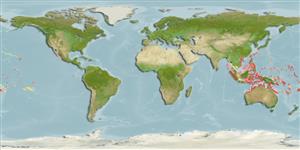>
Blenniiformes (Blennies) >
Blenniidae (Combtooth blennies) > Blenniinae
Etymology: Meiacanthus: Greek, meion = less = lessen + Greek, akantha = thorn (Ref. 45335).
Environment: milieu / climate zone / depth range / distribution range
Ecologia
marinhas associadas(os) a recifes; intervalo de profundidade 0 - 18 m (Ref. 58018). Tropical; 30°N - 22°S
Western Pacific: Moluccas and the Philippines east to Samoa, north to Ryukyu Islands, south to Rowley Shoals in Western Australia and the northern Great Barrier Reef and Tonga; Palau (Belau) in Micronesia.
Tamanho / Peso / Idade
Maturity: Lm ? range ? - ? cm
Max length : 6.5 cm TL macho/indeterminado; (Ref. 90102)
Descrição suscinta
Chaves de identificação | Morfologia | Morfometria
Espinhos dorsais (total) : 5 - 6; Raios dorsais (total) : 22 - 25; Espinhos anais: 2; Raios anais : 15 - 18. Males with long filaments from the tips of the tail (Ref. 48636).
Adults are found on reef slopes with large soft-coral communities (Ref. 48636). They form groups usually among gorgonians or black coral (Ref. 90102) in shallow protected reefs. Relatively common and broadly distributed. Feed on zooplankton. Oviparous. Eggs are demersal and adhesive (Ref. 205), and are attached to the substrate via a filamentous, adhesive pad or pedestal (Ref. 94114). Larvae are planktonic, often found in shallow, coastal waters (Ref. 94114). Minimum depth from Ref. 58018.
Ciclo de vida ou comportamento de acasalamento
Maturities | Reprodução | Spawnings | Egg(s) | Fecundities | Larvas
Oviparous, distinct pairing (Ref. 205).
Myers, R.F., 1991. Micronesian reef fishes. Second Ed. Coral Graphics, Barrigada, Guam. 298 p. (Ref. 1602)
Status na Lista Vermelha da UICN (Ref. 130435)
Uso pelos humanos
Ferramentas
Relatórios especiais
Baixar XML
Fontes da internet
Estimates based on models
Preferred temperature (Ref.
123201): 25.7 - 29.3, mean 28.5 °C (based on 1738 cells).
Índice de diversidade filogenética (Ref.
82804): PD
50 = 0.5000 [Uniqueness, from 0.5 = low to 2.0 = high].
Bayesian length-weight: a=0.00562 (0.00258 - 0.01228), b=3.06 (2.87 - 3.25), in cm total length, based on LWR estimates for this (Sub)family-body shape (Ref.
93245).
Nível Trófico (Ref.
69278): 3.4 ±0.45 se; based on food items.
Resiliência (Ref.
120179): Elevada, tempo mínimo de duplicação da população menor que 15 meses (Preliminary K or Fecundity.).
Fishing Vulnerability (Ref.
59153): Low vulnerability (10 of 100).
Nutrients (Ref.
124155): Calcium = 196 [100, 373] mg/100g; Iron = 1.06 [0.61, 1.83] mg/100g; Protein = 18.2 [17.0, 19.3] %; Omega3 = 0.104 [0.054, 0.196] g/100g; Selenium = 21.9 [10.2, 50.3] μg/100g; VitaminA = 226 [75, 707] μg/100g; Zinc = 2.15 [1.38, 3.19] mg/100g (wet weight);
